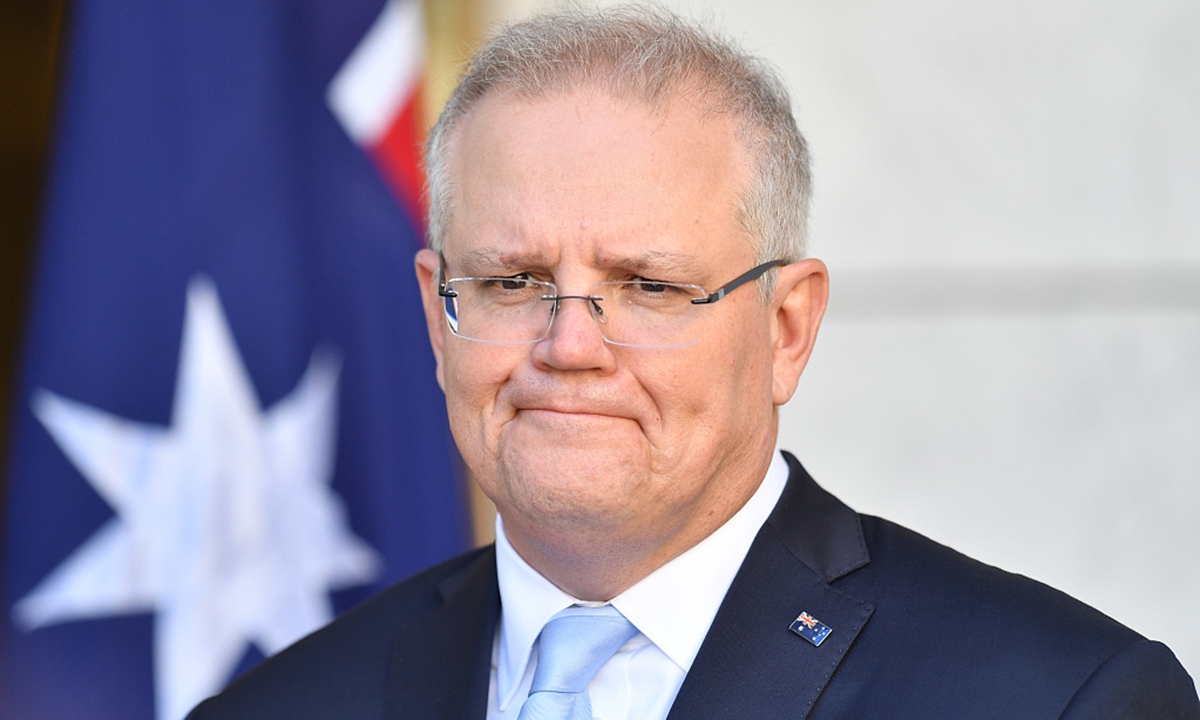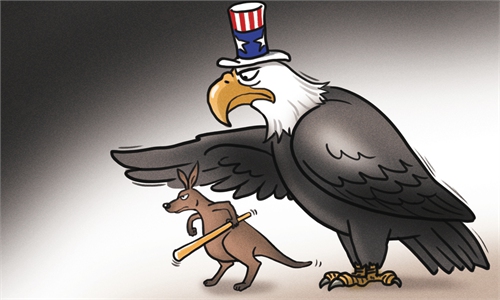
Australian Prime Minister Scott Morrison. Photo: VCG
Editor's Note:Australia has led the US in terms of being tough on China. And now it is going even further. This has confused many Chinese people. Why does Canberra act so proactively in the anti-China campaign? As federal elections approach, what will China-Australia relations be like in the future? Will it continue to ebb away to an even lower level? Rod Campbell (Campbell), research director at the Australia Institute, shared his views on these points with Global Times (GT) reporter Xu Hailin in an interview via email.
GT:As you said, "There's still a lot of mutual interest between China and Australia." But why has it been harder for policymakers in Canberra to value such voices that support building on the mutual interests of the two countries?
Campbell: I spent a lot of time in China from 2005 to 2008, working on an agricultural development program in Gansu, then as a tour leader and then at the Olympics. Compared to now, I think the Australia-China relationship was going very well then. I saw this at a granular level with the cooperation between individuals and organizations like Gansu Agricultural University, Lanzhou University, Adelaide University and our CSIRO.
I think there is still huge mutual interest between Australian and Chinese researchers, companies and other organizations. My view is that both governments, certainly the Australian Government, have increasingly focused on playing to a domestic audience at the expense of diplomacy. I think if that could be reversed, a lot of the individual and organizational level relationships could reinvigorate the relationship. Particularly if collaborations like I was a part of were actively supported by governments.
GT: In the past few years, especially since 2018, ordinary Australians' perception of China has been seriously poisoned. What's the role of coordinated disinformation efforts in this regard? Someone in Australia said the government funded lawyers trying to shut down critics of the Australian government's China policy. What's your opinion about this?
Campbell: I'm optimistic that ordinary Australians actually remain interested in and reasonably positive about China. I think people can see through some of the cruder political mudslinging. The Australia Institute has published research on coordinated disinformation regarding China and coronavirus conspiracy theories. In my view, this is aimed at very niche right wing audiences, largely in the US, and doesn't have much impact on the vast majority of Australians.
GT: There have been some media reports saying there have been no serious consequences from Morrison administration's "decoupling" with China. Is that really the case? Recently, Western Australia and Victoria are parting ways with the federal government in seeking to rebuild trade ties with China. Why have the two Australian states decided to break with Canberra in this regard?
Campbell: I think there have been serious consequences - for the Aus-China relationship and for the many people, companies and organizations that are affected by it. For the Morrison Government the deteriorating China relationship hasn't seen an obvious impact on voters' intentions, but foreign policy issues often struggle to change voters' minds compared to domestic issues such as tax, health or education policies.
The Victorian and WA Governments have strong incentives to keep engaged with China, perhaps more than other states and territories. Melbourne's CBD and its classrooms, shops and apartments seem empty without Chinese students, while the WA Government receives substantial royalties from iron ore sales to China. Companies and organizations in Melbourne and Perth will be pushing to keep Chinese relations positive.
The Federal Government doesn't face the same incentives in terms of revenue and lobbying, and is pushed by different interests, such as security and defense organizations that have less involvement with the states. The states can't "get rid" of the Federal Government, but they do face different incentives.
GT: Australia has gone even further than the US in terms of being tough on China. Many Chinese are confused by this. In your opinion, is this caused by the personal motives of Australian leaders? Or is it because Canberra's diplomacy has been kidnapped by US interest groups?
Campbell: I think Australian politicians, as well as their American and probably Chinese counterparts, always like to look tough in general. We've seen terrible results in Australia as our leaders have tried to look tough on asylum seekers, tough on welfare recipients and tough on other countries pushing us on climate change.
Looking tough on China is an extension of this approach. It's all very simplistic, and because it is so simplistic moving closer to the US is seen as an inevitable part of being tough on China. The AUKUS development demonstrates this. I don't think it's that our diplomacy has been kidnapped by the US, but our "tough guy" leaders have been happy to engage with like-minded types in the US.
GT: Since the Morrison administration started finding fault with China, many shares in the Chinese market that originally belonged to Australia were taken by American companies. What are averages Aussies' opinions about this?
Campbell: Average Aussies don't work in industries that are big exporters to China, so I suspect they don't really think about it, even though there is quite a lot of media coverage of China trade sanctions. Industries like mining and agriculture employ perhaps 4 percent of the workforce. And only part of those industries are focused on Chinese exports.
Most Australians work in domestically-focused service industries like health care, retail, construction, etc. I'm sure they're not happy about restrictions on Australian products, but I don't think it affects the daily lives of the vast majority of Australians.
One exception is higher education - a big employer and quite China focused. But from what I've seen, the sector is focused on combating government funding cuts and getting through the pandemic, rather than competition from US universities.
GT: As federal elections approach, what will China-Australia relations be like in the future? Will it continue to even lower ebbs? Or will voters do something with their votes to set limits for those extreme politicians?
Campbell: Very few votes are affected by foreign policy in general. Even though the Aus-China relationship is in a terrible state, people are far more interested in issues like corruption in politics, tax and related spending on health care and education, and climate change.
In the lead up to the election, most politicians would see little advantage in openly pushing for better China relations, but considerable risk in being described as "weak on China." So I think for the next few months we're unlikely to see any improvement and could well see things get worse.
After the election, whoever wins, this pressure will be off and relations can improve. Hopefully in 2022 Aus-China relations will get back on track. If travel restrictions lift, I might even try to contribute to this with a trip back to my adopted laojia in Gansu, Lanzhou.


